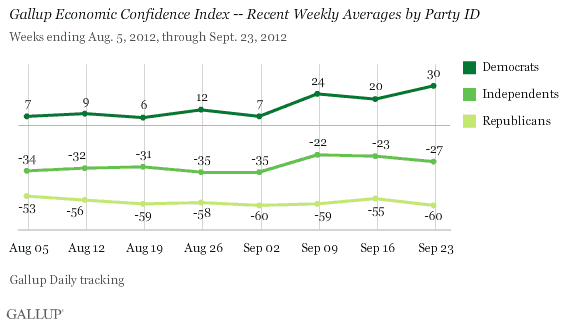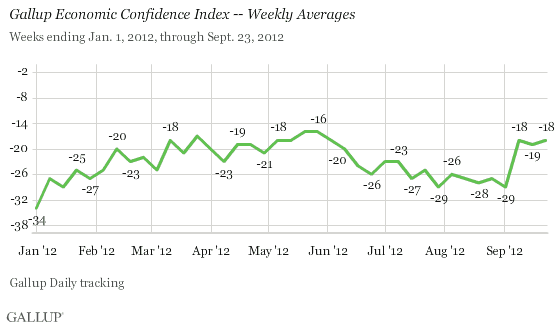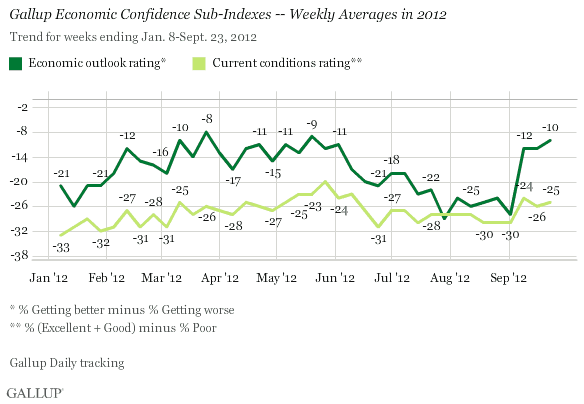WASHINGTON, D.C. -- Democrats' economic confidence continues to grow in the second half of September, building on a sharp increase that coincided with the Democratic National Convention. Independents' economic confidence dropped four percentage points in the week ending Sept. 23, tempering a sharp increase in the group's economic confidence that also coincided with the start of the Democratic convention. At the same time, at -60, Republicans' overall confidence in the economy declined, and is once again tied for the lowest it has been since November 2011.

Democrats' 10-point increase in economic confidence last week contributed to the overall Gallup Economic Confidence Index's holding steady near the highest level seen this year, despite Republicans' and independents' lower economic confidence. The index averaged -18 for the week ending Sept. 23, essentially where it has been for the last three weeks.

Current Assessments of the Economy Remain Mostly Unchanged
Of the two measures that make up the Gallup Economic Confidence Index, Americans' economic outlook has shown more improvement than their perceptions of current economic conditions.
Net perceptions of current economic conditions -- that is, the percentage rating the economy "excellent" or "good" minus the percentage calling it "poor" -- are now -25, on par with where they have been since the week ending Sept. 9, but still slightly better than the -30 at the start of the month.
Americans' net economic optimism -- that is, the percentage saying the economy is getting better minus the percentage saying it is getting worse -- improved to -10 last week, up slightly from -12 in the prior week. Americans' net economic optimism thus remains sharply higher now than its -28 reading in the week ending Sept. 2.

Bottom Line
While Democrats' economic confidence has continued to improve since the start of the Democratic National Convention, independents' confidence in the economy has fallen back slightly but remains above the levels seen prior to the convention.
Republicans' lack of confidence likely reflects the fact that the economy is still struggling nearly four years after the economic downturn. Democrats' greater optimism probably stems from the improvement in some aspects of the economy since President Barack Obama took office and Democrats' continued focus on them during and after the convention. With the political campaign only intensifying, and the election's outcome hinging on the health of the economy, it is possible the partisan gap in economic confidence will expand further over the next several weeks.
Gallup.com reports results from these indexes in daily, weekly, and monthly averages and in Gallup.com stories. Complete trend data are always available to view and export in the following charts:
Daily: Employment, Economic Confidence, Job Creation, Consumer Spending
Weekly: Employment, Economic Confidence, Job Creation, Consumer Spending
Read more about Gallup's economic measures.
View our economic release schedule.
Survey Methods
Results are based on telephone interviews conducted as part of Gallup Daily tracking survey Sept. 17-23, 2012, with a random sample of 3,379 adults, aged 18 and older, living in all 50 U.S. states and the District of Columbia.
For results based on the total sample of national adults, one can say with 95% confidence that the maximum margin of sampling error is ±1 percentage point.
Interviews are conducted with respondents on landline telephones and cellular phones, with interviews conducted in Spanish for respondents who are primarily Spanish-speaking. Each sample includes a minimum quota of 400 cell phone respondents and 600 landline respondents per 1,000 national adults, with additional minimum quotas among landline respondents by region. Landline telephone numbers are chosen at random among listed telephone numbers. Cell phone numbers are selected using random-digit-dial methods. Landline respondents are chosen at random within each household on the basis of which member had the most recent birthday.
Samples are weighted by gender, age, race, Hispanic ethnicity, education, region, adults in the household, and phone status (cell phone only/landline only/both, cell phone mostly, and having an unlisted landline number). Demographic weighting targets are based on the March 2011 Current Population Survey figures for the aged 18 and older non-institutionalized population living in U.S. telephone households. All reported margins of sampling error include the computed design effects for weighting and sample design.
In addition to sampling error, question wording and practical difficulties in conducting surveys can introduce error or bias into the findings of public opinion polls.
For more details on Gallup's polling methodology, visit www.gallup.com.
